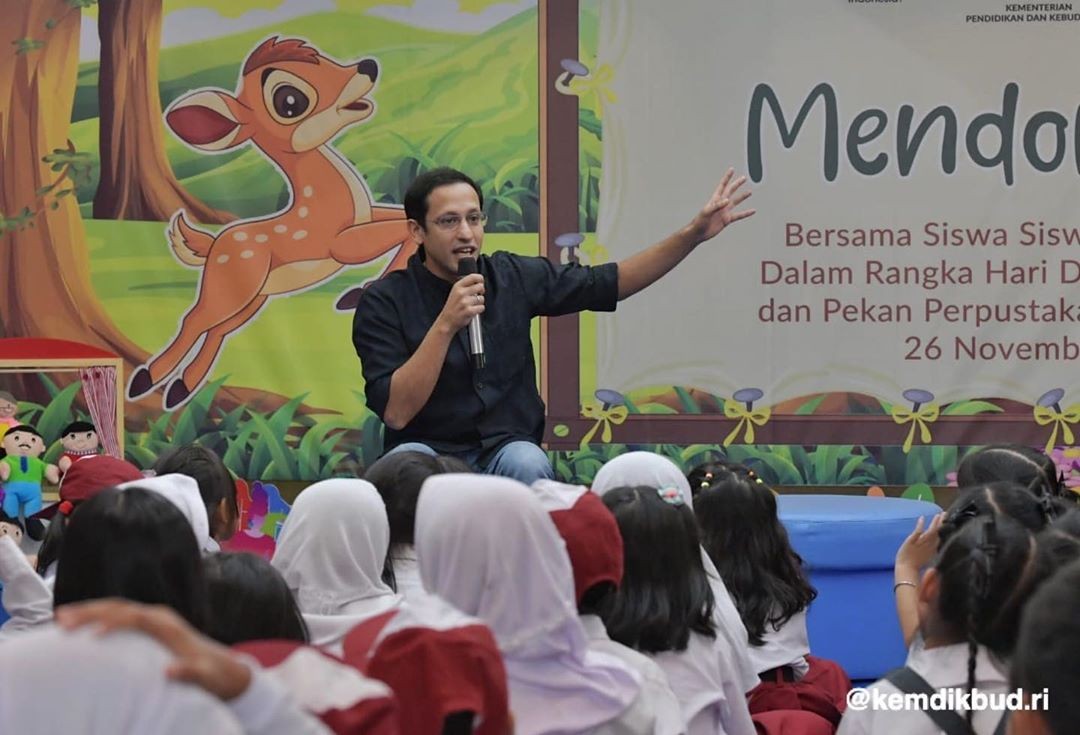Popular Reads
Top Results
Can't find what you're looking for?
View all search resultsPopular Reads
Top Results
Can't find what you're looking for?
View all search resultsNadiem in hot water after PGRI, NU, Muhammadiyah withdraw from education ministry program
Minister doesn’t understand the history of these organizations in Indonesia, says PAN executive.
Change text size
Gift Premium Articles
to Anyone
E
ducation and Culture Minister Nadiem Makarim has come under fire after several organizations voiced their concerns over the involvement of private enterprises in the ministry’s latest teacher training grant program.
The Mobilization Organization Program (POP) is part of the minister’s Freedom to Learn initiative that aims to improve the quality of teachers by involving communities and organizations.
The ministry had selected 156 out of 4,464 organizations that registered for the program. Among them were the Tanoto Foundation and the Putera Sampoerna Foundation.
The Tanoto Foundation is a philanthropic organization focusing on education founded by forestry tycoon Sukanto Tanoto. Meanwhile, the Putera Sampoerna Foundation is deemed by many to have a connection to tobacco giant PT Hanjaya Mandala Sampoerna.
The decision to include the two foundations in the program, however, has outraged the Indonesian Teachers Association (PGRI) and the two-largest Muslim organizations in the country, Nahdlatul Ulama (NU) and Muhammadiyah. They have expressed their objections and withdrawal from the program.
“The ministry’s criteria for selecting participants are unclear,” PGRI chair Unifah Rosyidi wrote in a statement on Friday.
Read also: Home learning hindered by technology gap, Nadiem acknowledges
She added that the ministry should reallocate the program’s budget to help poor students and teachers by providing better infrastructure, especially in rural areas amid school closures during the COVID-19 outbreak.
“We don’t think the program can be implemented effectively and efficiently. It’s better to avoid undesirable consequences,” Unifah went on to say.
The three organizations were selected to participate in the “Elephant” category of the program, making them eligible for the largest grant of Rp 20 billion (US$1.3 million) to train teachers at 100 schools. Tanoto and Sampoerna foundations were also selected in the same category.
The NU’s Maarif Institute chairman, Arifin Junaidi, echoed Unifah’s concern: “It turns out that there are many unqualified organizations and foundations.”
Meanwhile, Muhammadiyah’s elementary and middle education assembly chairman, Kasiyarno, said corporate social responsibility (CSR) institutions should not participate in the government’s program.
Read also: Distance learning threatens to exacerbate education inequality in Indonesia
Islam-based political party politicians also criticized the ministry’s decision, saying organizations with investors should not participate and get support from the state budget.
“Organizations with strong backup don’t need state budget assistance,” National Awakening Party (PKB) chairman Muhaimin Iskandar said.
National Mandate Party (PAN) executive Saleh Daulay called on President Joko “Jokowi” Widodo to replace Nadiem, saying the government needed a minister who understood the country’s problems in education.
“It’s no surprise that Muhammadiyah and NU decided to withdraw from the program. […] [Nadiem] doesn’t understand the history of these organizations in Indonesia,” said Saleh.
According to the ministry, the program has three funding options: a fully-funded scheme sourced from the state budget, matching funds scheme and self-financing scheme.
Tanoto Foundation spokesperson Haviez Gautama said the foundation would choose the self-financing scheme upon participating in the program, while asserting it had no connection to the corporations owned by its founder.
“The Tanoto Foundation will invest more than Rp 50 billion [from 2020 to 2022]. We won’t use the government’s money or state budget,” Haviez said, adding that the foundation had proposed no funding in its proposed budget plan for the program.
While reaffirming that the foundation had no connection to the tobacco company, Putera Sampoerna Foundation spokesperson Ria Sutrisno said it had chosen the matching-fund scheme upon participating in the program.
“We chose a partnership scheme with various parties as our commitment to collaborate in advancing education,” Ria said, as quoted by tempo.co.
The foundation has allocated around Rp 70 billion for teachers improvement and Rp 90 billion for education access improvement. Ria, however, did not reveal the amount of funding it would receive from the state budget to run its program.
Read also: Pak Nadiem, please send the kids back to school
Responding to the criticism, Minister Nadiem said the ministry would evaluate the program before its implementation. His office would involve the community and state institutions during the evaluation, he went on to say.
“We have to make sure this program is done with accountability and integrity,” Nadiem said during a press briefing on Friday evening.
He added that the evaluation would focus on the integrity of the selection process, credibility of selected organizations and the organization’s effectiveness in running the program during the COVID-19 epidemic.
“We will also involve parties that have a history in advancing education in the country,” the minister added.










